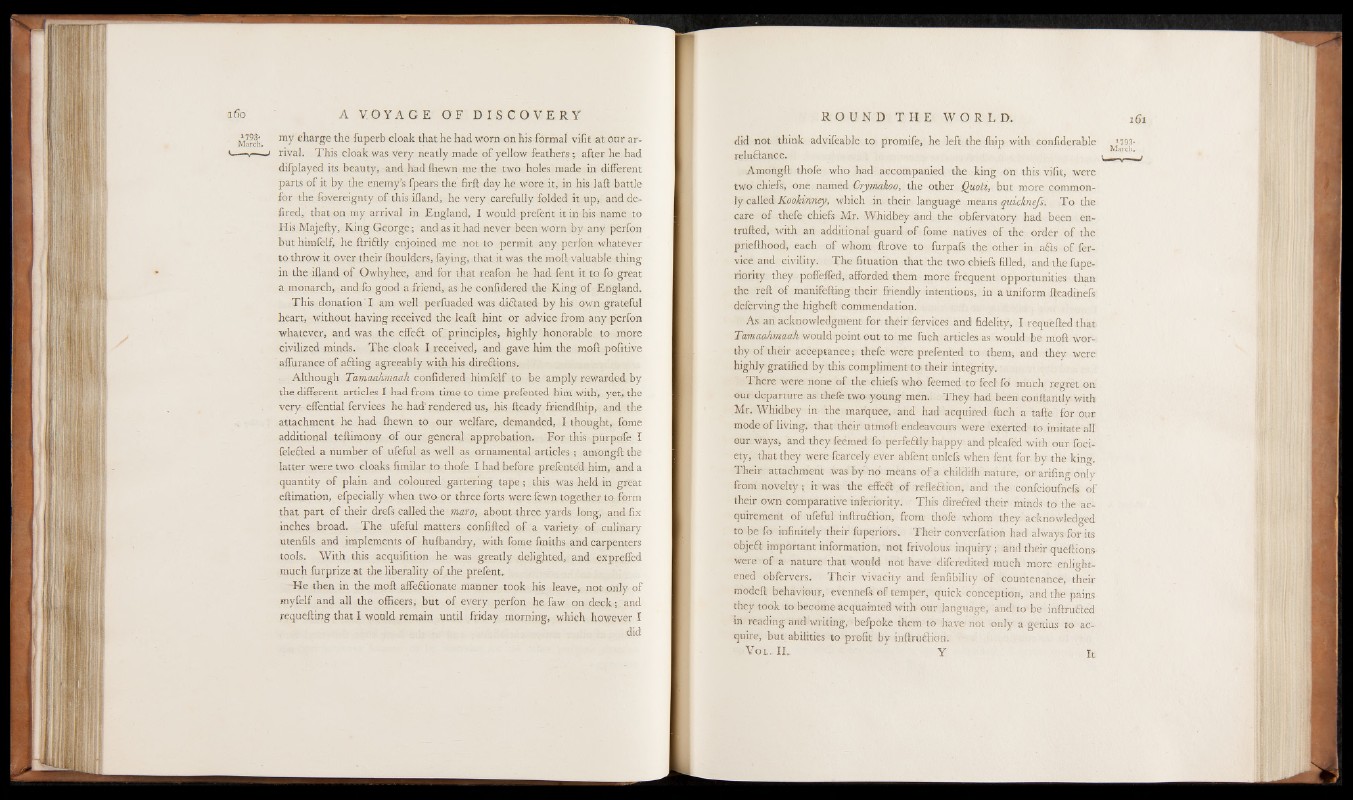
March my charge the fuperb cloak that he had worn on his formal vifit at our ar-
— r— > rival. This cloak was very neatly made o f yellow feathers; after he had
difplayed its beauty, and had Ihewn me the two holes made in different
parts o f it by the enemy’s fpears the firft day he wore it, in his laft battle
for the fovereignty of this ifland, he very carefully folded it up, and de-
fired, that on my arrival in England, I would prefent it in his name to
His Majefty, King George; and as it had never been worn by any perfon
but himfelf, he ftriftly enjoined me not to permit any perfon whatever
to throw it over their Ihoulders, faying, that it was the moll valuable thing
in the ifland o f Owhyhee, and for that reafon he had fent it to fo great
a monarch, and fo good a friend, as he confidered the King of England.
This donation I am well perfuaded was dictated by his own grateful
heart, without having received the leall hint or advice from any perfon
whatever, and was the effeft of principles, highly honorable to more
civilized minds. The cloak I received, and gave him the moll politive
affurance of aiding agreeably with his directions.
Although Tamaahmaah conlidered himfelf to be amply rewarded by
the different articles I had from time to time prefented him with, yet, the
very elfential fervices he had’ rendered us, his Heady friendlhip, and the
attachment he had Ihewn to our welfare, demanded, I thought, fome
additional teftimony of our general approbation. For this purpofe I
felecled a number of ufeful as well as ornamental articles ; amongll the
latter were two cloaks limilar to thofe I had before prefente'd him, and a
quantity o f plain and coloured gartering tape; this Was held in great
eftimation, efpecially when two or three forts were fewn together to foTm
that part of their drefs called the maro, about three yards long, and fix
inches broad. The ufeful matters confilled of a variety o f culinary
utenfils and implements of hulbandry, with fome fmiths and carpenters
tools. With this acquifition he was greatly delighted, and exprelfed
much furprize at the liberality o f the prefent.
He then in the moll affeftionate manner took his leave, not only of
myfelf and all the officers, but of every perfon he faw on deck; and
requelting that I would remain until friday morning, which however I
did
did not think advifeable to promife, he left the Ihip with conliderable ’ 793-
, „ ‘ March.
reluctance. ■ ~ »
Amongll thofe who had accompanied the king on this vifit, were
two chiefs, one named Crymakoo, the other Quoti, but more commonly
called Kookinney, which in their language means quicknefs. T o the
care of thefe chiefs Mr. Whidbey and the obfervatory had been en-
trulled, with an additional guard of fome natives o f the order of the
priellhood, each of whom ftrove to furpafs the other in aids o f fer-
viee and civility. The fituation that the two chiefs filled, and the fupe-
riority they poflefled, afforded them more frequent opportunities than
the reft of manifelling their friendly intentions, in a uniform lleadinefs
deferving the higheft commendation.
As an acknowledgment for their fervices and fidelity, I requefted that
Tamaahmaah would point out to me fuch articles as would be moll worthy
of their acceptance; thefe were prefented to them, and they were
highly gratified by this compliment to their integrity.
There were none o f the chiefs who feemed to feel fo much regret on
our departure as thefe two young men. They had been conftantly with
Mr. Whidbey in the marquee, and had acquired, fuch a tafte for our
mode of living, that their utmoft endeavours were exerted to imitate all
our ways, and they feemed fo perfeftly happy and pleafed with our foci-
ety, that they were fcarcely ever abfent unlefs when fent for by the king.
Their attachment was by no means o f a childilh nature, or arifing Only
from novelty ; it was the effeft of relleftion, and the confcioufnefs o f
their own comparative inferiority. This directed their minds to the acquirement
of ufeful inftruftion, from thofe whom they acknowledged
to be fo infinitely their fuperiors. Their converfation had always for its
objeft important information, not frivolous inquiry; and their queftions-
were o f a nature that would not have difcredited much more enlightened
obfervers. Their vivacity and fenfibility of countenance, their
modeft behaviour, evennefe of temper, quick’conception, and the pains
they took to become acquainted with our language, and to be inllrufted
in reading and writing, befpoke them to have not only a genius to acquire,
but abilities to profit by inftruftion.
V o l . I L Y It